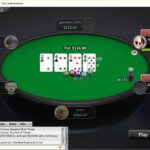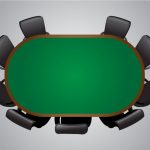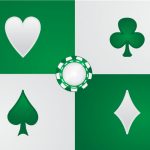This is a continuation of Radashack’s essay on Multi-Table Tournament advice and strategies. Click here to read Radashack’s MTT Tournament Advice Part 1.
Your Why
A large part of success is understanding your motivation to be successful (in anything). So why do you want to be a successful tournament player? The answer is obvious, the money, but what does that money mean to you? You need to really dig down and see what the money really means to you. You need to focus on the pain of not having that money. What things in your life does that affect? From that you build your why, include your dreams that can be accomplished, the pain that will be relieved, the stress, the anxiety, etc. Take a minute and re-read this part of the post then get out a notepad and start your why, and read on.
Your why is an important driver in your development as a player. It’s what is going to inspire you fix the holes in your game, study harder, and become more successful. Your why should always be in visible reach, carried with you, posted around you to always remind you of where you are and where you want to be. Combined with some written goals should be the roadmap on how you are going to get there. Many of us do this subconsciously to an extent, but “good paper good friends” as said in the business world, you need to make it real and in your own handwriting.
“The Art of Misdirection”
What makes a good player into a scary player? When the good player can no longer be put on a hand or a pattern. They become unpredictable and you can’t put them on a hand.
A predictable player is a beatable player.
A great way to become this terror of the table is to practice some misdirection. This is done by doing things like raising and then showing down rags, minraising at infrequent times, re-raising with a suited connector and showing off. It gets to a point where your table has 0 reads on you besides “maybe this guy is a lucky fish, or a great player, or maybe just a maniac.” Then an interesting thing happens, people become afraid to play with you. “Why play against that guy when I know that player b will fold to a re-raise every time, I’ll pick a better spot?” There are a few players who do this well, and when you learn how you too can steal your way into a stack by playing great poker and maintaining a “terror” image.
Another good misdirection play, which I like to do later in a tournament, is the steal, steal, bigger steal, or a variation of. Basically it is where you steal blinds in position with a 3xbb raise, do the same the next hand, and then the very next hand you raise it 4xbb or more. The table is thinking he must have snagged a great hand on that last one… that 95o sure is a monster.
Another way to think about it is an “extended bluff.” When you bluff at a hand you are trying to misrepresent your hand or create a situation that is uncallable for your opponent, misdirecting your opponents’ reads, and capturing a pot. By creating this image you are trying to create a situation that the table would just all together avoid playing into or with, allowing you, with smart play, to acquire a stack with less reliance to the luck of a race.
Weakness and Strength
As you read through these boards you’ll see a lot about sensing weakness and strength, but I recently got asked, “How do you do it?” The best place to start is to examine the angles by asking yourself some questions. Questions to ask:
First the action of the tournament: What is the table feel (i.e. aggressive, loose, tight, etc.)? What stage of the tournament is it? How will this impact my opponent?
Then your opponents’ action: What was the initial action of the player? What was their bet size? What was the action before them? What position were they in? Their table image thus far, etc.
Next your action: What did I do (call, check raise)? In what position did I do what I did in relation to my opponent? What is my table image?
Some of these questions you are already aware of the answers, but better safe than sorry. Then fill in the blanks with the answers.
Situation: Late in the tourney, tight table, close to the bubble. My opponent raises in mid position for 3xbb (standard for them), no one acted before them, and the player is fairly tight. I cold called on the button to see a flop for the first time in 2 orbits. Flop comes rags and my opponent checks.
By throwing all this together you can see that while your opponent had a marginal starting hand, this flop looks like it missed them. Their check seems weak so you bet.
If something else happens you just plug it back into the “equation.” One of the most important factors is YOUR image. Have you been seen stealing pots on the flop? Do you bet out every flop? As your feel for the game and your personal style/approach develops, all of this will continue to become easier to “see.”
Fear
Fear is a huge factor in poker. You can’t win if you are afraid. It’s that simple. Emotional detachment is an extremely import factor in your game. It can be the difference of thousands of dollars, or even more. There are a few different aspects of fear that come into play.
Situational fear:
Probably the most common for a newer player, the fear of busting out, the fear of pushing your chips, the fear of trusting your reads, etc. Improving this is all about developing your game. The more confidence you have in your ability, and the more experience you have, the less this will be a factor for you.
Fear of the money:
Believe it or not, some people are afraid of actually making money and will sabotage themselves. The only way to overcome this is figure out why you are afraid to make money. (Do you think it will change you? Make you a worse person?)
Fear of risk:
Many semi successful players experience this type of fear. These are the people with 5k bankrolls playing 15 dollar SNGs or 12k bankroll playing NL100. Fact of the matter is this hurts you. It keeps you stagnant and closes off your game for improvement.
Put a kid in any sport and put him on the team where he is one of the best players. His game will remain the same. He will help out the team, but will not excel to be better, and will eventually be passed up. Put the same kid on a team that has a higher caliber and he will play his best and be in a constant state of improvement.
The thing is you have to be willing to risk more. This isn’t saying balls to the wall 50% of your BR in a single game, but a good 5% risk per day playing the biggest and best games you can find, constantly using the resources around (FTR) to improve as you move up.
——–
Also anyone, who is interested in a poker lesson, you can e-mail me at
Include name, game of interest, game type, and workable times.
Play what’s in front of you
Too often we get caught up with standings, average chip stacks, time played, payout, and everything else a tournament lobby contains. These things are completely irrelevant to any tournament you are in. These things shouldn’t matter to you at all. The only thing you need to focus on is the table that’s in front of you. The rest of those things are just distractions and can in fact hurt you. From missing a key hand or getting so worked up about money and other things that you clam up (if you dig through some archives there is a post where I realized I was focusing on the money and not on my game and losing). If you are really going to win you need to be able to beat your table. This means finding the soft spots, spotting people’s betting patterns, and picking up on player nuances and tendencies (player a bets the flop every time, watch out when he checks he hit). These are the important things, not that you are 2 from the money, or you are 1k about the average stack.
Another thing along the same lines is you have to realize what type of table you have in front of you. If you take these advice posts and apply the style, ideas, and knowledge to a $5 freezeout with 1800 people or even a $5 SNG, it’s not going to work. You have to adapt constantly with the table in front of you. Yes you can take bits and pieces of information and apply it, but it’s not all going to apply. Having the ability to take your knowledge and know that players ABCD in this SNG are fish but EF are moderate players so you can apply more pressure and possibly steal from the last two, but are going to have to beat the others with cards, will help tremendously to make you into a better player.
The only way to win is to beat the table that in front of you, whether it’s a 1 table SNG or 200 table multi. All you can do is beat that table in front of you.
Aggression
Online multi table tournaments favor the aggressors, the guys who aren’t afraid to put their chips on the line to build an edge and ultimately win a MTT. Very rarely if at all will you see a tight camper make the final table. Campers by nature are timid with their hands until they get a monster. Late in a tournament 10 hands changes the entire game, aces come only every 1/220 hands. Do the math.
Another great aspect about aggression is that you control your table, and the more you combine aggression with misdirection the more the table just stays away from you, because in their mind there are 8 or 9 other people that they can play against and know what those people are playing, or at least have a good idea. You? You‘re an enigma. They don’t know if you have Aces this time or pocket 2’s, or even J9.
A lot of people overdue aggression and wind up taking the early exit once it gets late, but the thing to remember is you’re not a maniac. You aren’t pulling things like 27 from middle position, but you are taking 67o from 1 behind the cutoff in a folded pot. You also need the stack to do this late in a MTT. Once you get down to about 15bb, you are looking to push and accumulate, raising 3xbb at this point puts you in a very bad situation.
The type of things you are looking for are tight players, folded pots, and decent position (mp-cutoff). You are always maintaining 1 steal per orbit (keeps your stack even), and looking for 2-3. Late in MTT’s this adds up massively.
Don’t get attached to your hands. If someone comes over the top of you for 2/3rd of your stack and you are holding KT, play a little Hollywood (let the time run down), but don’t commit yourself unless you have to, or you know you’re ahead or a solid coin flip (to take the race if you need the chips). Yeah you might have been caught for 3xbb, but that’s nothing. Two steals later and you’re even, so why risk a showdown of mediocrity when you can recover with minimal effort? Protect your stack. It’s what wins you the money.
A Revelation of sorts
Recently (over the past few months) I’ve experienced and watched people have slides. However I was thinking about these slides the other day, and went back and evaluated some HH, how I and others were playing, and was amazed. When I was looking at my own stuff, I found that I did take some beats, but some of the hands I lost were where I played things just slightly different then I normally would, maybe a slight under bet, or over bet, or checked in the wrong place. A lot of little things added up to me busting.
Then I watched some others, and noticed the same thing in their game. Little minor things adding up to bust after bust after bust, creating a massive slide, month long losing streaks, weeks without being ITM, and Bubble-mania.
Then I took a look at the times I’ve won. The beats were still there, a few struggles, but no tiny mistakes setting me up for a crashing bust. Which leads me to:
Natural vs Mental Variance
Natural Variance: The beats are ever present, and will always happen, hopefully when it happens you have the stack to absorb it and move on. If not you are on to the next tourney to do it all again.
Mental Variance: Getting knocked out of 6 tournaments with KK in a single day, then playing a bit more timid with them the next time, but over betting your jacks (because hey, jacks have been good to you today).
MV – “Man this SUCKS!!! I raise preflop 3xbb in LP with AQ and the guy on the BB calls with J8, and of course chases for a runner straight to knock me out!”
Problem with the above statement is that on any other day you would see that the BB had a massive stack and was playing every 2 cards for limps – 3xbb no matter what and has been snapping people for the past half hour. So you’d over bet your AQ and make him fold for some blinds. Instead you were playing a bit timid, licking some wounds and going through the motions. When the flop came QT2 you got excited, value bet a bit to try and get something for your Q, got called and saw the A hit the turn. You check hoping to check raise, and the 9 drops on the river. You bet, get re-raised, and push all in with top two.
Man that guy sucks right?
Fact of the matter is, if you can manage to stay mentally even, and just play your same game over and over, you will be a winning player, You don’t have to posses fantastic skill, you don’t have to be as good as a great talented poker player, you just have to be able to consistently approach the game on an even keel and play a consistent game.
So whenever you feel like you are getting the short end of the stick, be sure to take a step back and really examine what you are doing and how you are playing.
Submit your review | |








